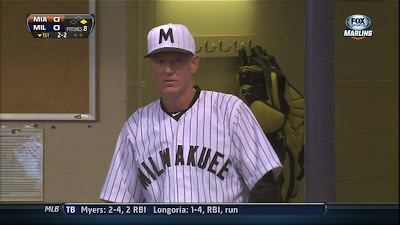Potawatomi Indians and several other tribes once inhabited
the Lake Michigan region where present-day Milwaukee sits. European explorers
first traveled to the southeastern Wisconsin area in the late 1600s, and the
earliest references to Milwaukee come from that period.
The name may derive from a Potawatomi word meaning “meeting
place of waters” or “gathering place by the river.” Early explorers called the
area many names. Variations included Miliwaki, Milawakee and Milwauki.
Countless other Mil-wacky versions were in the rotation from the late 1600s to
the middle of the 19th century, including Mahnawauk, Melleorki and, yes,
Milwacky — but never Milwakuee. Remember that.
Most of the various spellings were dropped, but two
persisted, and allegiances were split along party lines. For reasons that are
unclear, the region’s Democrats favored Milwaukie;
the Whigs (Republicans) preferred Milwaukee.
The name fluctuated — in papers and postmarks — depending on which side was in
control, flexing its political clout. Agreeing on a standard spelling would take decades and not be easy. When politics come into play, is anything?
The Milwaukee Sentinel,
founded in 1837 as a four-page weekly, became the Milwaukie Sentinel in 1841, when Democrats seized control, and
reverted to its original name in early 1846, shortly after Rufus King, a
Republican, became editor.
Milwaukee used Milwaukie
as its postmark from 1835, when a post office was established under Democrat
Solomon Juneau, until 1843, when a Whig named Josiah Noonan became postmaster
and changed the spelling to Milwaukee.
It reverted to Milwaukie in 1849,
when Juneau regained office. The back-and-forth antics continued, with the
postmark changing to Milwaukee in
1853, Milwaukie in 1857 and, finally,
to Milwaukee in 1861. The citizens of
the growing metropolis came to realize that conformity was key, which is why
Milwaukee remains, well, Milwaukee.
But the losing name lived on elsewhere.
The Democrats’ preferred spelling didn’t stick in Wisconsin,
but it influenced a city more than 2,000 miles away. An entrepreneur
living in Illinois in the 1840s named Lot Whitcomb admired Milwaukee and hoped
to find a city that would prosper as it did. His manifest destiny took him
west, toward the Pacific. Whitcomb arrived in Oregon in 1847, constructed a
sawmill and referentially named his settlement Milwaukie. Whitcomb likely adopted the spelling in use during his
visits to Wisconsin’s largest city.
Milwaukie, Wisconsin, may no longer exist, but Milwaukie,
Oregon, does. The Portland suburb is where the Bing cherry was developed and is
home to Dark Horse Comics, which publishes the Sin City series.
Speaking of sins…
On July 20, 2013, the Milwaukee Brewers hosted the Miami
Marlins. As a tribute to the Negro Leagues, both MLB teams donned throwback
uniforms. The Brewers honored the 1923 Milwaukee Bears … sort of. Brewers
manager Ron Roenicke somehow managed to wear a uniform bearing a glaring error
rivaling the “Natinal” dilemma in D.C. four years earlier.
I understand that spelling mistakes occur. We all make them.
I’m sure you’ll find ones on my blog from time to time. (If you do, I implore
you to notify me. I’ll correct them ASAP.) But a mistake of this magnitude,
under these circumstances? Boggles my mind.
Roenicke’s uniform was really put through the mill. Does the
manufacturer have no quality control? And when the wacky Milwaukee uni arrived
at its destination, how come no team officials realized trouble brewed? In
other words, how’d Milwakuee manage
to slip past the equipment manager? I don’t know. All I do know is that it did, at which point you’d hope (expect?)
the guy putting on the jersey would notice. Roenicke didn’t. If an equipment
manager had handed me that throwback uniform, it would have been thrown back in
his direction.
In 1923, Milwaukee was spelled Milwaukee. Eighty or so years earlier, it was spelled Milwaukee and Milwaukie. More than a century before that, it was spelled too many
ways to list again. (See the second paragraph.) Never, I repeat, never was it spelled
Milwakuee.

No comments:
Post a Comment